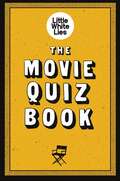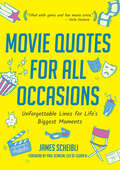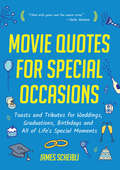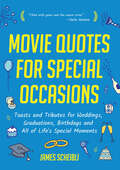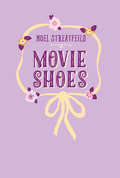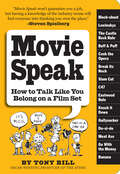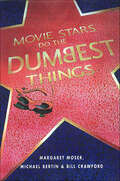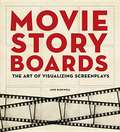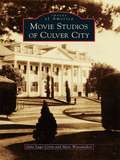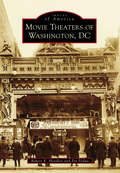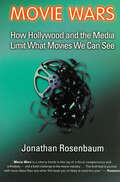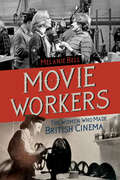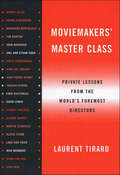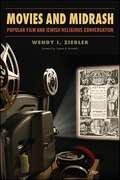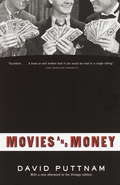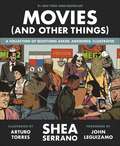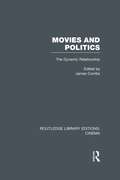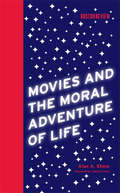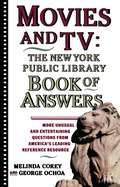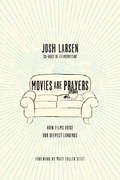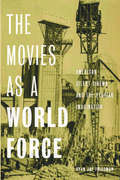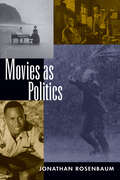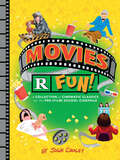- Table View
- List View
The Movie Quiz Book
by White LiesImagine the best pub quiz you've ever been to, but without suffering the hangover the next morning!From heroic heroines, famous final lines and award-winning directors, to Hollywood's golden age, memorable movie flops and the film world's biggest franchises, the book's over 1,600 questions cover every aspect of the movies. Thrown in among the brain-testing questions are a series of visual quizzes and challenges—including an It's a Wonderful Life spot-the-difference and the world premiere of a Jean-Claude van Damme-themed wordsearch!Put together by the team at indie film magazine Little White Lies, The Movie Quiz Book includes 120 movie quizzes, from seriously difficult text-based, to downright silly illustrated visual quizzes.The Movie Quiz Book is illustrated by Sophie Mo.
The Movie Quiz Book
by Little White LiesImagine the best pub quiz you've ever been to, but without suffering the hangover the next morning!From heroic heroines, famous final lines and award-winning directors, to Hollywood's golden age, memorable movie flops and the film world's biggest franchises, the book's over 1,600 questions cover every aspect of the movies. Thrown in among the brain-testing questions are a series of visual quizzes and challenges—including an It's a Wonderful Life spot-the-difference and the world premiere of a Jean-Claude van Damme-themed wordsearch!Put together by the team at indie film magazine Little White Lies, The Movie Quiz Book includes 120 movie quizzes, from seriously difficult text-based, to downright silly illustrated visual quizzes.The Movie Quiz Book is illustrated by Sophie Mo.
Movie Quotes for All Occasions: Unforgettable Lines for Life's Biggest Moments
by James ScheibliFind a film quotation for any situation in this collection that’s “full of gems” (Varla Ventura, author of The Book of the Bizarre).From Rhett Butler to Obi-Wan Kenobi, movie quotes have become an integral part of the way we express ourselves. This book gathers great lines with a purpose in mind: finding the right words to toast, celebrate, motivate, or comfort during the important occasions in our lives—whether it’s a wedding, a big game, a memorial service, a graduation, or a workplace event.Moving, inspiring, or just plain funny, you’ll find lots of options—or you can just enjoy reading—with this volume that also includes plenty of trivia and viewing suggestions for movie lovers.
Movie Quotes for Special Occasions: Toasts and Tributes for Weddings, Graduations, Birthdays and All of Life's Special Moments
by James ScheibliFilm buffs—find the perfect words for any special occasion in this handy movie quotation reference guide.Whether it’s Casablanca, Cabaret, Clueless, or The Cable Guy, you probably have favorite flicks you often quote. And it’s true, “We’ll always have Paris.” From A Man Called Horse to Zoolander and everything in between, our beloved films have excellent writing and memorable dialogue; we have talented Hollywood screenwriters to thank for the brilliant one-liners we love. Movie quotes have become an integral part of our culture and expression.The movie quotes that often show up on “best of” lists rarely lend themselves to important moments in life. On how many special occasions can you say “May the Force be with you”? Open up most movie quote lists or books and you’re likely to see “Play it again, Sam,” or “There’s no place like home.” Yet there are so many lines just under the radar that are the stuff of pure poetry and sheer genius. That’s where cinephile and true movie buff James Scheibli comes in! In Movie Quotes for Special Occasions, he has scoured the movies of the world to track down the most fitting and fabulous movie quotes for every special occasion.From graduations to birthdays to wedding toasts to golden anniversaries, film scholar James Scheibli provides cinematic quotes that are moving, memorable, inspirational, and deeply meaningful. These quips, quotes, and scene-stealing lines do more than just remind us of the movies they came from. They transcend their stories and enrich your life. Whether from blockbuster megahits or forgotten indies, Movie Quotes for Special Occasions has the right quote for the right occasion—and it’s a great gift for movie lovers, anniversary gift, or coffee table book for your friends and family to enjoy.
Movie Quotes for Special Occasions: Toasts and Tributes for Weddings, Graduations, Birthdays and All of Life's Special Moments
by James ScheibliGreat Movie Quotes for Life’s Special MomentsIf you enjoyed 1001 Movies You Must See Before You Die, What If? or Movie Quotes for All Occasions, you'll love Movie Quotes for Special Occasions.Move Quotes Are Classic: Whether it’s Casablanca, Cabaret, Clueless, or The Cable Guy, you probably have favorite flicks you often quote. And it’s true, “We’ll always have Paris.” From A Man Called Horse to Zoolander and everything in between, our beloved films have excellent writing and memorable dialogue; we have talented Hollywood screenwriters to thank for the brilliant one-liners we love. Movie quotes have become an integral part of our culture and expression.Special Quotes for Special Occasions: The movie quotes that often show up on “best of” lists rarely lend themselves to important moments in life. On how many special occasions can you say “May the Force be with you”? Open up most movie quote lists or books and you’re likely to see “Play it again, Sam,” or “There’s no place like home.” Yet there are so many lines just under the radar that are the stuff of pure poetry and sheer genius. That’s where cinephile and true movie buff James Scheibli comes in! In Movie Quotes for Special Occasions, he has scoured the movies of the world to track down the most fitting and fabulous movie quotes for every special occasion.Fitting for Any Speech, Toast, or Card: From graduations to birthdays to wedding toasts to golden anniversaries, film scholar James Scheibli provides cinematic quotes that are moving, memorable, inspirational, and deeply meaningful. These quips, quotes, and scene-stealing lines do more than just remind us of the movies they came from. They transcend their stories and enrich your life. Whether from blockbuster megahits or forgotten indies, Movie Quotes for Special Occasions has the right quote for the right occasion.Movie Quotes for Special Occasions is a great movie lover gift, anniversary gift, or coffee table book for your friends and family to enjoy.
Movie Shoes (The Shoe Books)
by Noel StreatfeildFor the first time ever in the United States, the "Shoes" books are available as ebooks! Go behind the scenes of a movie in this beloved classic!Life is tough for the Winter family in London, with little money and Dad out of work. Luckily, Aunt Cora comes to the rescue with an invitation to live in California. From that moment on, talented Rachel and Tim dream of stardom in America. The family couldn't be more surprised when a movie producer picks plain, peevish Jane for the lead role of Mary in The Secret Garden. No one's ever noticed Jane before. Could this be the chance of a lifetime?Noel Streatfeild's "Shoes" books are some of the most popular of the thirty-eight books she wrote for children.
Movie Speak: How To Talk Like You Belong On A Movie Set
by Tony Bill<P>When is "groucho" not a comedian? <P> A "seagull" not a bird? <P><P>A "banana" not a fruit, and a "taco cart" not a food stand? <P>What's the "Castle rock rule" and when should you call for a "buff & puff"? <P>And why expect trouble when the A.D. (assistant director) knowingly mumbles "Gone With the Wind in the morning, Dukes of Hazzard after lunch"? <P>An oral tradition gathered and passed down for more than a hundred years, the language of moviemaking, like other secret lexicons, is the only accepted way of communicating on a set—and is all but unknown to the outside world. Technical, odd, colorful, mysterious, the working language of movies sheds light not only on the hugely complex process of making a film, but on the invisible hierarchies of a set, the unspoken etiquette between cast and crew, and the evolution of a process that's endlessly fascinating. <P><P> Movie Speak is a book about language, but through language also a book about what it’s really like to be a director or a producer or an actor or a crew member. An Oscarwinning producer (The Sting), actor (who worked with Spielberg, Coppola, and Sydney Pollock), and director (Five Corners, Flyboys, My Bodyguard, and more), Tony Bill has been on sets for more than 30 years and brings a writer's love of language to this collection of hundreds of film terms. A futz. A cowboy. A Brodkin and a double Brodkin (a.k.a. screamer). Streaks ’n tips, a Lewinsky, Green Acres, rhubarb, a peanut, a Gary Coleman, snot tape, twin buttes, manmaker (and why you can yell for one if needed for a grip, but must whisper if it's for Tom Cruise)—these are the tricks of the trade.
Movie Stars Do the Dumbest Things
by Margaret Moser Michael Bertin Bill CrawfordJohnny Depp. Marilyn Monroe. Marlon Brando. Leonardo DiCaprio. Woody Allen. Shanron Stone. What do all of these actors have in common? They're outrageous, receive huge salaries, have enormous egos, and have way too much spare time. Their out-of-control lifestyles prove that, as one Hollywood observer noted, "Hollywood is a trip through a sewer in a glass-bottomed boat." You'll learn which director was furious when he was misquoted as saying, "Actors are cattle." He claimed he had really said, "Actors should be treated as cattle." You'll discover that Bruce Wilis ordered the final scenes in Striking Distance to be re-shot at a cost of over $750,000 because the original shots exposed his toupee.You'll find that Melanie Griffith explained her ignorance of the Nazi holocaust by saying, "I don't know why I didn't know. Maybe I missed school that day...I'm not stupid." Whether you're a fan of Hugh Grant, Dennis Hopper, or Whoopi Goldberg, you'll learn about all of the embarrassing moments in your favorite star's life. From actors like Ben Affleck and Cameron Diaz to screen legends like Frank Sinatra and Judy Garland, Movie Stars Do the Dumbest Things is proof that actors are more childish and impulsive than you've ever imagined.
Movie Storyboards
by Fionnuala HalliganThis comprehensive and enlightening collection--the first of its kind--features storyboard art from the last 100 years, covering more than 50 classic, cult, and popular films. Much of the artwork included here has never been published, including early drawings from such great artists as William Cameron Menzies (Gone With the Wind), Mentor Huebner (North by Northwest, Ben-Hur), Salvador Dali (Spellbound), and Saul Bass (Psycho, Spartacus), plus work from contemporary artists such as Jane Clark (the Harry Potter series). Augmented throughout with insights from the designers, directors, and artists who share some of their secrets and tips from behind the scenes, Movie Storyboards is an essential collection for any film student or true fan.
Movie Studios of Culver City
by Julie Lugo Cerra Marc WanamakerAfter watching pioneer filmmaker Thomas Ince film one of his famous Westerns on Ballona Creek, city founder Harry Culver saw the economic base for his city. Culver announced plans for the city in 1913 and attracted three major movie studios to Culver City, along with smaller production companies. "The Heart of Screenland" is fittingly etched across the Culver City seal. These vintage images are a tour through the storied past of this company town on the legendary movie lots bearing the names of Thomas Ince, Hal Roach, Goldwyn, Metro-Goldwyn-Mayer, Lorimar, MGM-UA, Columbia, Sony Pictures, DeMille, RKO-Pathe, Selznick, Desilu, Culver City Studios, Laird International, the Culver Studios, and such nearly forgotten mini-factories as the Willat Studios. On these premises, Gone With the Wind, The Wizard of Oz, Citizen Kane, E.T: The Extra-Terrestrial, and other classics were filmed, along with tens of thousands of television shows and commercials featuring Elvis Presley, the Beatles, Michael Jackson, and many others.
Movie Trivia Quiz Book
by The Editors at Ventura BooksHundreds of questions (and answers) about movies made before 1981.
Movie Wars: How Hollywood and the Media Limit What Movies We Can See
by Jonathan RosenbaumIs the cinema, as writers from David Denby to Susan Sontag have claimed, really dead? Contrary to what we have been led to believe, films are better than ever--we just can't see the good ones. Movie Wars cogently explains how movies are packaged, distributed, and promoted, and how, at every stage of the process, the potential moviegoer is treated with contempt. Using examples ranging from the New York Times's coverage of the Cannes film festival to the anticommercial practices of Orson Welles, Movie Wars details the workings of the powerful forces that are in the process of ruining our precious cinematic culture and heritage, and the counterforces that have begun to fight back.
Movie Workers: The Women Who Made British Cinema (Women & Film History International #1)
by Melanie BellRolling the credits on six decades of women in film After the advent of sound, women in the British film industry formed an essential corps of below-the-line workers, laboring in positions from animation artist to negative cutter to costume designer. Melanie Bell maps the work of these women decade-by-decade, examining their far-ranging economic and creative contributions against the backdrop of the discrimination that constrained their careers. Her use of oral histories and trade union records presents a vivid counter-narrative to film history, one that focuses not only on women in a male-dominated business, but on the innumerable types of physical and emotional labor required to make a motion picture. Bell's feminist analysis looks at women's jobs in film at important historical junctures while situating the work in the context of changing expectations around women and gender roles. Illuminating and astute, Movie Workers is a first-of-its-kind examination of the unsung women whose invisible work brought British filmmaking to the screen.
Moviemakers' Master Class: Private Lessons from the World's Foremost Directors
by Laurent TirardFrom Scorsese and Lynch to Wenders and Godard, interviews with twenty of the world's greatest directors on how they make films--and whyEach great filmmaker has a secret method to his moviemaking--but each of them is different. In Moviemaker Master Class, Laurent Tirard talks to twenty of today's most important filmmakers to get to the core of each director's approach to film, exploring the filmmaker's vision as well as his technique, while allowing each man to speak in his own voice. Martin Scorsese likes setting up each shot very precisely ahead of time--so that he has the opportunity to change it all if he sees the need. Lars Von Trier, on the other hand, refuses to think about a shot until the actual moment of filming. And Bernardo Bertolucci tries to dream his shots the night before; if that doesn't work, he roams the set alone with a viewfinder, imagining the scene before the actors and crew join him. In these interviews--which originally appeared in the French film magazine Studio and are being published here in English for the first time--enhanced by exceptional photographs of the directors at work, Laurent Tirard has succeeded in finding out what makes each filmmaker--and his films--so extraordinary, shedding light on both the process and the people behind great moviemaking.Among the other filmmakers included are Woody Allen, Tim Burton, Joel and Ethan Coen, and John Woo.
Movies and Midrash: Popular Film and Jewish Religious Conversation
by Wendy I. ZierlerFinalist for the 2017 National Jewish Book Award in Modern Jewish Thought and Experience presented by the Jewish Book CouncilMovies and Midrash uses cinema as a springboard to discuss central Jewish texts and matters of belief. A number of books have drawn on films to explicate Christian theology and belief, but Wendy I. Zierler is the first to do so from a Jewish perspective, exploring what Jewish tradition, text, and theology have to say about the lessons and themes arising from influential and compelling films. The book uses the method of "inverted midrash": while classical rabbinical midrash begins with exegesis of a verse and then introduces a mashal (parable) as a means of further explication, Zierler turns that process around, beginning with the culturally familiar cinematic parable and then analyzing related Jewish texts. Each chapter connects a secular film to a different central theme in classical Jewish sources or modern Jewish thought. Films covered include The Truman Show (truth), Memento (memory), Crimes and Misdemeanors (sin), Magnolia (confession and redemption), The Descendants (birthright), Forrest Gump (cleverness and simplicity), and The Hunger Games (creation of humanity in God's image), among others.
Movies and Money
by David PuttnamFrom David Puttnam--producer of such modern film classics as Chariots of Fire, The Killing Fields, Midnight Express, and The Mission, and the only European to have run a major Hollywood studio--an insightful and provocative history that explains the personalities and events which shaped film's transformation from a technological curiosity into one of the world's most powerful cultural and economic forces. From the early rivalry between its inventors to the power-brokering and political influence of today's mega-stars; from Zukor and Laemmle to Ovitz and Eisner; from the serendipitous discovery of Los Angeles ("flagstaff no good," wired Cecil B. De Mille. "want authority to rent barn for $75 a month in place called hollywood") to the exploitation and depredation of Europe's film culture in the name of the marketplace, Puttnam captures the urgency and wonder that swept through a young industry and set it spinning on an axis of money and power. Movies and Money chronicles the unprecedented collision between art and commerce, and incisively analyzes its implications in today's global arena. Puttnam's engaging history is also an impassioned polemic: From the moment Thomas Edison stole the first crude attempt at a movie camera from the French scientist Étienne Jules Marey, Hollywood and Europe have existed, the author claims, in a state of undeclared hostility--hostility that has occasionally erupted into open battle for control of the century's most powerful artistic medium. And this battle, he contends, will ultimately determine the nature of Europe's cultural identity. He also argues forcefully for the intelligent application of the language and techniques of cinema to education, urging filmmakers to make films that challenge and inspire as well as entertain. Ten years after his abrupt departure from Columbia, Puttnam re-enters the debate about cinema with characteristic audacity, with the irreverence of an iconoclast and the canniness of a seasoned player. Movies and Money is a book that will change our understanding of the history--and future--of film.From the Hardcover edition.
Movies (And Other Things)
by Shea Serrano#1 New York Times bestselling author Shea Serrano is back, and his new book, Movies (And Other Things), combines the fury of a John Wick shootout, the sly brilliance of Regina George holding court at a cafeteria table, and the sheer power of a Denzel monologue, all into one. p.p1 {margin: 0.0px 0.0px 0.0px 0.0px; line-height: 18.0px; font: 14.7px Tahoma; color: #000000; -webkit-text-stroke: #000000; background-color: #ffffff} p.p2 {margin: 0.0px 0.0px 0.0px 0.0px; line-height: 18.0px; font: 14.7px Tahoma; color: #000000; -webkit-text-stroke: #000000; min-height: 18.0px} p.p3 {margin: 0.0px 0.0px 0.0px 0.0px; line-height: 17.0px; font: 14.7px Arial; color: #000000; -webkit-text-stroke: #000000} span.s1 {font-kerning: none} span.s2 {font-kerning: none; background-color: #ffffff} Movies (And Other Things) is a book about, quite frankly, movies (and other things). One of the chapters, for example, answers which race Kevin Costner was able to white savior the best, because did you know that he white saviors Mexicans in McFarland, USA, and white saviors Native Americans in Dances with Wolves, and white saviors Black people in Black or White, and white saviors the Cleveland Browns in Draft Day? Another of the chapters, for a second example, answers what other high school movie characters would be in Regina George's circle of friends if we opened up the Mean Girls universe to include other movies (Johnny Lawrence is temporarily in, Claire from The Breakfast Club is in, Ferris Bueller is out, Isis from Bring It On is out...). Another of the chapters, for a third example, creates a special version of the Academy Awards specifically for rom-coms, the most underrated movie genre of all. And another of the chapters, for a final example, is actually a triple chapter that serves as an NBA-style draft of the very best and most memorable moments in gangster movies. Many, many things happen in Movies (And Other Things), some of which funny, others of which are sad, a few of which are insightful, and all of which are handled with the type of care and dedication to the smallest details and pockets of pop culture that only a book by Shea Serrano can provide.
Movies and Politics: The Dynamic Relationship (Routledge Library Editions: Cinema)
by James CombsCollecting together some of the best thinking about the relationship between movies and politics, this book, originally published in 1993, encourages an awareness of the political dimension of film, both for film scholars and those entering the film industry. Eight essays are grouped into four parts addressing political ideology and movie narrative, political myth in the movies, political history and movie culture, and political communication and the movies. An introductory essay, as well as prefatory remarks to each of the four parts, brings additional insight and perspective and puts the essays into context.
Movies and the Moral Adventure of Life (Boston Review)
by Alan A. StoneEssays on small art films and big-budget blockbusters, including Antonia's Line, American Beauty, Schindler's List, and The Passion of the Christ, that view films as life lessons, enlarging our sense of human possibilities. For Alan Stone, a one-time Freudian analyst and former president of the American Psychiatric Society, movies are the great modern, democratic medium for exploring our individual and collective lives. They provide occasions for reflecting on what he calls “the moral adventure of life”: the choices people make—beyond the limits of their character and circumstances—in response to life's challenges. The quality of these choices is, for him, the measure of a life well lived. In this collection of his film essays, Stone reads films as life texts. He is engaged more by their ideas than their visual presentation, more by their power to move us than by their commercial success. Stone writes about both art films and big-budget Hollywood blockbusters. And he commands an extraordinary range of historical, literary, cultural, and scientific reference that reflects his impressive personal history: professor of law and medicine, football player at Harvard in the late 1940s, director of medical training at McLean Hospital, and advisor to Attorney General Janet Reno on behavioral science. In the end, Stone's enthusiasms run particularly to films that embrace the sheer complexity of life, and in doing so enlarge our sense of human possibilities: in Antonia's Line, he sees an emotionally vivid picture of a world beyond patriarchy; in Thirteen Conversations about One Thing, the power of sheer contingency in human life; and in American Beauty, how beauty in ordinary experience draws us outside ourselves, and how beauty and justice are distinct goods, with no intrinsic connection. Other films discussed in these essays (written between 1993 and 2006 for Boston Review) include Un Coeur en Hiver, Schindler's List, Pulp Fiction, Thirteen Days, the 1997 version of Lolita, The Battle of Algiers, The Passion of the Christ, Persuasion, and Water.
Movies and TV: The New York Public Library Book of Answers
by Diane Corey Melinda Corey George OchoaIf you're a movie or television fan - how many of these questions can you answer? What was the last picture show in The Last Picture Show? Where was the stagecoach headed in Stagecoach? What was the name of the dinosaur bone in Bringing Up Baby? What did Gomer Pyle do before he entered the Marines? Who played Gentle Ben? Like The Book of Answers, this book answers hundreds of questions in one of the New York Public LIbrary Telephone Reference Service's most popular areas - film and television. It covers the biggest stars, breakthrough productions, famous on-and-off-screen incidents, and film and TV history and trivia. Movies and TV: The New York Public Library Book of Answers is both informative and entertaining - a treasure trove of fascinating movie and TV facts, a perfect companion to The Book of Answers, and a real treat for movie and TV fans.
Movies Are Prayers: How Films Voice Our Deepest Longings
by Josh Larsen"Movies are our way of telling God what we think about this world and our place in it. . . . Movies can be many things: escapist experiences, historical artifacts, business ventures, and artistic expressions, to name a few. I'd like to suggest that they can also be prayers."Filmspotting
The Movies as a World Force: American Silent Cinema and the Utopian Imagination
by Ryan Jay FriedmanThroughout the silent-feature era, American artists and intellectuals routinely described cinema as a force of global communion, a universal language promoting mutual understanding and harmonious coexistence amongst disparate groups of people. In the early 1920s, film-industry leaders began to espouse this utopian view, in order to claim for motion pictures an essentially uplifting social function. The Movies as a World Force examines the body of writing in which this understanding of cinema emerged and explores how it shaped particular silent films and their marketing campaigns. The utopian and universalist view of cinema, the book shows, represents a synthesis of New Age spirituality and the new liberalism. It provided a framework for the first official, written histories of American cinema and persisted as an advertising trope, even after the transition to sound made movies reliant on specific national languages.
Movies as Politics
by Jonathan RosenbaumIn this new collection of reviews and essays, Jonathan Rosenbaum focuses on the political and social dynamics of the contemporary movie scene. Rosenbaum, widely regarded as the most gifted contemporary American commentator on the cinema, explores the many links between film and our ideological identities as individuals and as a society. Readers will find revealing examinations of, for example, racial stereotyping in the debates surrounding Do the Right Thing, key films from Africa, China, Japan, and Taiwan, Hollywood musicals and French serials, and the cultural amnesia accompanying cinematic treatments of the Russian Revolution, the civil rights movement, and the Vietnam War. From Schindler's List, Star Wars, Pulp Fiction, Forrest Gump, The Piano, and Ace Ventura: Pet Detective to the maverick careers of Orson Welles, Jacques Tati, Nicholas Ray, Chantal Akerman, Todd Haynes, and Andrei Tarkovsky, Rosenbaum offers a polemically pointed survey that makes clear the high stakes involved in every aspect of filmmaking and filmgoing.
Movies R Fun!: A Collection of Cinematic Classics for the Pre-(Film) School Cinephile
by Josh CooleyLet's face it, reading sucks . . . but movies are fun! In this children's picture book parody for grown-ups, Pixar writer and artist Josh Cooley presents the most hilariously inappropriate--that is, the best--scenes from contemporary classic films in an illustrated, for-early-readers style. Terrifying, sexy, and awesome scenes from such favorite films as Alien, Rosemary's Baby, Fargo, Basic Instinct, Seven, The Silence of the Lambs, Apocalypse Now, The Shining, and many more are playfully illustrated and captioned to make reading fun and exciting for kids who never grew up. A sly celebration of the things fans love most about these legendary films (and movies in general), this is one book that probably should not be read at bedtime.
